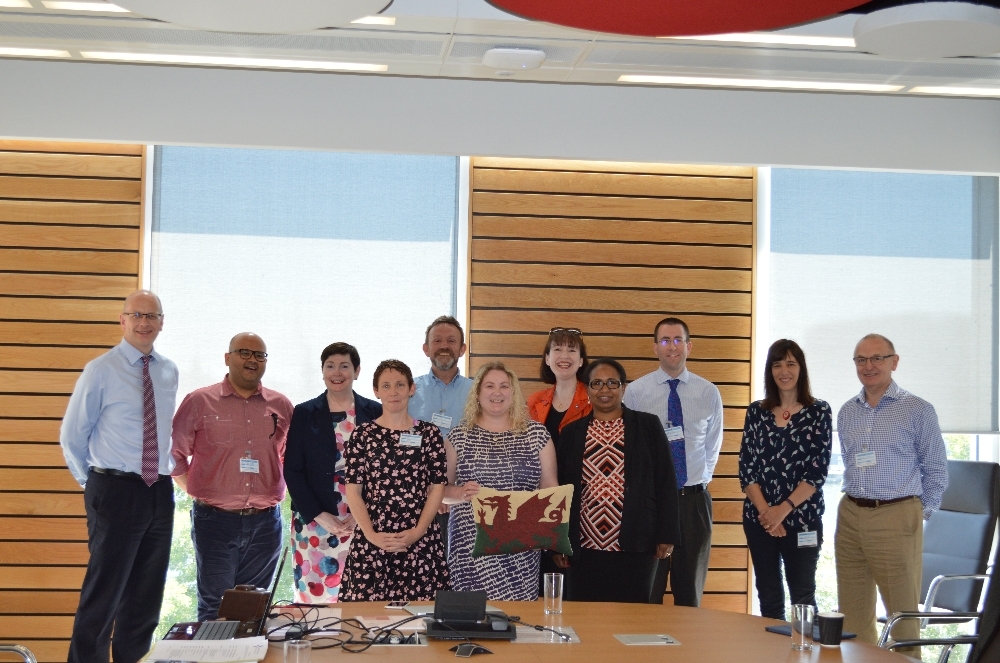Present at the event were health leaders, doctors, scientists, trainees and other colleagues, who gathered in Cardiff Bay’s Life Sciences Hub to celebrate the work of pathologists and clinical scientists in Wales.
Dr Esther Youd, Chair of the College’s Wales Regional Council, introduced the proceedings by highlighting the work of the regional council in acting as a conduit for communication between members in Wales and the College’s headquarters, monitoring local medical and scientific workforce statistics and keeping these up to date.

Wales Regional Council members at the regional council meeting which took place immediately before the symposium. From left to right: Dr Jonathan Kell, Dr Anurag Joshi, Professor Jo Martin, Dr Jim Seale, Dr Suzy Lishman, Dr Adam Christian, Dr Angharad Davies, Dr David Cassidy, and at the front Dr Alison Finall, Dr Esther Youd and Dr Huyam Abdelsalam.
The symposium featured a wide range of invited speakers, including Dr Muhammad Aslam, who presented the Wales experience of digital pathology, a project which was put in place to help address geographical, transport and workload challenges due to the merging of three North Wales hospitals into a single health board. The presentation included information on investment in IT developments required, verification of 3001 cases, system wide implementation, lessons learned, and the future of digital pathology in Wales.
This was followed by an overview of Myeloma, where Dr Ceri Bygrave illustrated some of the difficulties around curing the disease and the role of immunotherapy in improving disease response. Some of the techniques used for harnessing the immune system in Myeloma were presented alongside the way treatment has recently evolved.
Trainees were also invited to present their projects during the symposium, and the session featured participation of Mrs Deborah Pritchard and her presentation on comparing clinical decision making in H&I laboratories with EQA interpretative scenarios; Dr Emma Short and her explanation of genetic mechanisms in Colorectal Polyposis, and Dr Maggie Sanders’ presentation on quality improvement in histopathology services, evaluating the effect of short cycle processing on turnaround times for diagnostic H&E slide production.
During break delegates had the opportunity of observing over twenty different posters on display, highlighting the work of trainees and consultants in Wales. Abstracts for all posters are available on the resources area below.
Medical examiners and changes to death certification was one of the subjects widely discussed during the symposium. Dr Jason Shannon gave an overview of the purpose of medical examiners and their role on impacting healthcare improvement through integration with the Wales Mortality Review System. Implementation of the system was also expanded taking into consideration regulations, operational, workforce, funding and other important factors.
One day before the launch of the Genomics Strategy for Precision Medicine in Wales, Mrs Rhian White summarised the importance of genomics in precision medicine and how new genetic and genomic technologies have the potential to revolutionise medicine and public health. The talk clarified how this new strategy was developed and the setting up of a steering group to regularly review and respond to rapidly emerging technologies.
Speaking on behalf of the Swansea Cryptosporidium Reference Unit, Professor Rachel Chalmers expanded on the Cryptosporidium pathogen whole genome sequencing journey. The presentation highlighted how the parasite is transmitted and the challenges in preparing high quality DNA for whole genome sequencing given the difficulties in culturing this pathogen. Featured in the talk were developments made for improved parasite capture, cleaning and amplification processes, and development of specific bioinformatics pipelines for mass sequencing projects.
The afternoon closed with a word from the President, Dr Suzy Lishman, and President-elect, Professor Jo Martin. During the session Dr Lishman expanded on some of the College’s work streams and its involvement in wider projects and consultations, ranging from cancer reports to death investigation and development of International projects.
Resources

